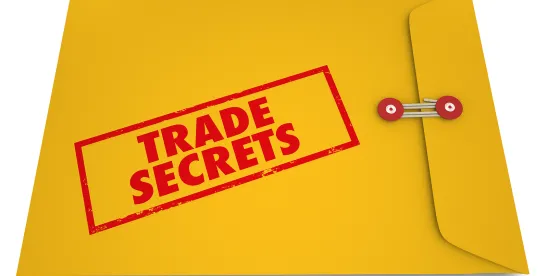In a world racing to master artificial intelligence, Congress is worried America’s secrets are slipping away. Recently, the House Judiciary Subcommittee on Courts, Intellectual Property, Artificial Intelligence, and the Internet held a hearing entitled “Protecting Our Edge: Trade Secrets and the Global AI Arms Race” to discuss the growing role of trade secrets in a world poised to rely more and more on Artificial Intelligence (“AI”).
Trade Secrets in the Global AI Arms Race
The United States is in a “global AI arms race,” underscored Chairman of the Subcommittee, Darrell Issa (R-CA).” With that, comes the need to balance the continued protection of trade secrets, proprietary data sets, and other key aspects of AI models against the “guise of transparency” the public demands according to Representative Issa. This likely refers to the surge of lawsuits over unauthorized data use in training AI models. A recent New York Times piece on DeepSeek—China’s leading AI system—illustrates the concern. Despite U.S. investments approaching $1 trillion, compared to less than one-third of that by China, DeepSeek has still managed to compete head-to-head with established American players like OpenAI. To explore these challenges, the Subcommittee brought in experts to share their perspectives and recommendations.
Trade Secrets as Critical Infrastructure
Nicholas Andersen—a former senior cybersecurity official—set the stage by emphasizing the critical need to protect American trade secrets amidst escalating global AI competition. Andersen highlighted the systematic and state-sponsored nature of foreign intellectual property theft, describing it as a direct threat to U.S. technological and economic leadership. His primary concern was the erosion of strategic deterrence against such threats that continue to diminish U.S. trade secrets. In his words, AI isn’t just a new technology but rather “critical infrastructure” that is continuously being attacked by adversaries. Sometimes, these attacks are undetected, coming into the U.S. as trojan horses disguised by start-ups promising to be “the next big thing.” Implementing screening mechanisms, barring engagement with foreign militaries or governments, and requiring the disclosure of AI-involved technologies where the above groups are involved are potential solutions suggested by Andersen.
Legal Gaps and Enforcement Limits
As AI becomes smarter, more efficient, and more engrained into society—both via everyday consumers as well as government and private-sector integration—so does the value of the trade secrets they hold. Trade secrets, by definition, retain value by the very fact they’re not disclosed to the public. In the past, inventors could rely on patent or copyright protection for technologies that were not easily reverse-engineered. Today, however, those protections are far less effective for AI innovations that can be copy-pasted or reverse-engineered abroad, leaving Americans with little to no recourse. Currently, the Economic Espionage Act (18 U.S.C. § 1831 et seq.) and the Defend Trade Secrets Act (18 U.S.C. § 1836 et seq.)criminalize and create a civil right of action against the misappropriation of trade secrets. However, this right of action is limited to U.S. courts, and the few international avenues for addressing trade secret theft are widely regarded as inefficient and impractical. Christopher Mohr of the Software & Information Industry Association highlighted the lack of effective international remedies and urged Congress to strengthen defenses. His proposals included increasing cybersecurity support for smaller firms, leveraging the Committee on Foreign Investment in the U.S. reviews to block unauthorized data and trade secrets transfers, and promoting the development of AI systems independent of foreign providers. Mr. Mohr was of the belief that less disclosure of training data, model weights, and other AI material is the better choice.
From Litigation to National Security
Dr. Benjamin Jensen of Marine Corps University argued that trade secret theft must be treated as a national security threat, not merely a civil litigation matter. In his words, the growing use of AI is a “race to dominate the agentic era” and is “now a central feature of 21st century great power competition” which should not be left to civil litigation solutions. He proposed that the U.S. needs to act under a national security threat to consider things like tax credits, international agreements on criminal penalties, and other incentives to encourage cooperation and punish maligned actors. A key point to Dr. Jensen’s policy arguments is the premise that certain foreign entities continue to bypass United States export controls—preexisting regulations that seek to prevent foreign actors from gaining access to trade secrets, sensitive data, and the semiconductors and other hardware needed to efficiently run these larger AI programs.
The Talent Challenge
Representative Kamlager-Dove (D-CA) pressed a different concern. She stressed the importance of considering the who involved in AI not just the what. Referring to a recent “AI Talent Report” prepared by the Council of Economic Advisers to the White House from January 14, 2025, she questioned the impact any proposed regulations could have if the U.S. doesn’t address the attraction, development, and retention of foreign talent. Helen Toner from Georgetown University Center for Security and Emerging Technology acknowledged that one of the biggest advantages over foreign countries is the fact that the U.S. offers world-class education and opportunity. Restricting the pool of AI talent to only those born within the U.S. would severely limit the country’s ability to maintain its leadership in the world of AI. On this point, she cites to the fact that more than two-thirds of “top AI startups had an immigrant founder.”
What’s Next
Momentum is already building. The Commerce Department recently scrapped its proposed “AI Diffusion Rule” and is expected to issue stricter export controls. Meanwhile, on August 12, 2025, John Moolenaar (R-Mich)—Chairman of the House Select Committee on the Chinese Communist Party—requested the International Trade Commission ban the import of displays produced by BOE Technology Co., Ltd. (BOE). BOE is a foreign manufacturer of advanced OLED displays and has stirred U.S. concern for its alleged U.S. patent and trade secret theft. See e.g., Letter from Representative John Moolenaar, Chairman, House Select Committee on the CCP, to the Honorable Lloyd Austin, Secretary, U.S. Department of Defense (Sep. 24, 2024). Representative Moolenaar’s request comes on the heels of a July 2025 determination by the ITC that BOE violated Section 337, misappropriating trade secrets and recommended an exclusion order as to BOEs OLED display modules and components thereof. In the Matter of Certain Organic Light-Emitting Diode Display Modules and Components Thereof, USITC, 337-TA-1378. As technologies become more valuable, and the use of machine learning and AI drive the rate at which these technologies increase, the need to protect U.S. trade secrets and IP generally will only increase as well.
Takeaway for Companies
As AI becomes embedded in business and government, the value of the trade secrets behind these systems grows exponentially. Companies should carefully assess the provenance and security of any AI tools they authorize—whether open-source or proprietary—particularly when handling confidential data or GDPR-covered information. In the absence of clear regulatory guidance, organizations should coordinate across IT, compliance, and legal teams to adopt responsible practices that both enable innovation and protect the trade secrets and sensitive information underpinning their competitiveness.



 />i
/>i
